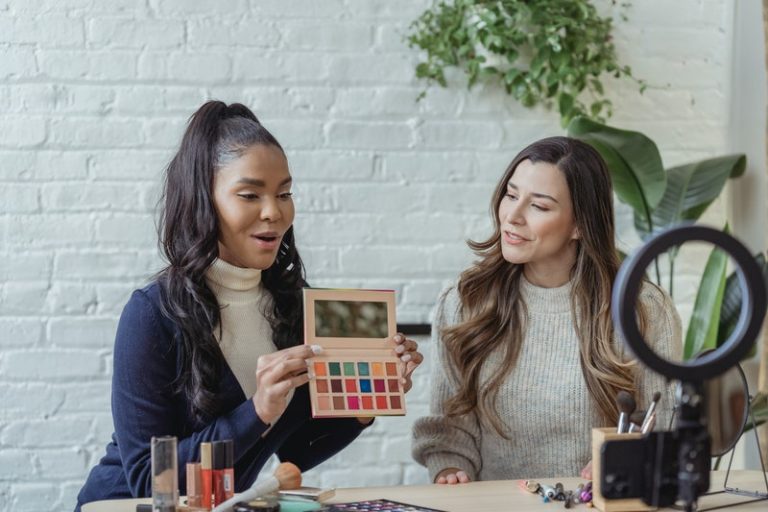Log onto Instagram and you’ll find brightly-hued photos of influencers offering glimpses of their lives, enviable travels, and of course the products they promote to their adoring fans. These followers await their favorite influencer’s next post for inspiration and to find out about the latest trends, while many outside observers question the merits of the influencer industry that’s expected to expand to $15 billion in 2022.
Half of millennials trust influencers they follow for product recommendations, and almost a quarter of millennials and GenZ women most often learn about new products from influencers.
Brands are going all-in on influencers
It’s not surprising that brands have bet on influencer marketing and set a portion of their marketing budget towards it, with some advertisers spending upwards of half a million dollars on an influencer campaign. Fifty-five percent of marketers planned on using influencer marketing in 2021, and marketers can expect a $5.70 return on every $1 spent on influencer marketing.
Social media platforms are investing in nurturing the next crop of influencers. Digital marketing courses now seem incomplete without a section dedicated to influencer marketing, and even Northwestern’s Kellogg School of Management has an eight-week online program on influencer marketing.
With brands needing more creative and cost-effective ways to build awareness and promote products, and as both brands and potential customers are abandoning traditional media like print and TV, brands and influencers are forming effective and lucrative partnerships.
Instagram influencer Denisse Myrick (@chasingdenisse), got started in the business unintentionally after being exposed through her work as a photographer in New York City. She became an influencer after the brands she met through networking events began recruiting her to promote their products. She also consults other influencers as a brand strategist.
“Influencer marketing is really powerful,” said Myrick, who has worked with brands such as Walmart, Oprah Daily, and Tuft & Needle – building an Instagram following of over 44,000. “I think that unless you’re in it or consume influencer content you don’t see that. And it’s hard for the older generation to understand that or just generally people that aren’t in it. There’s a lot of power in using a person as a billboard.”
Influencers are Entrepreneurs
Influencers are part of what’s referred to as the creator economy, a class of businesses composed of content creators, influencers, bloggers and videographers that use tools to help their business grow and monetize. These creators use tools to move fans to their own websites and apps, sometimes converting them to actual customers that pay for their products or services, according to the Creator Economy 2021 Report by The Influencer Marketing Factory.
Influencers themselves can earn millions of dollars, with the top influencers raking in about $18 million a year in sponsorships and other endeavors, out-earning many CEOs. Influencing is a viable career comparable to owning and managing a business. There’s brand management, accounting and finance, administration, data analytics, and negotiating contracts, all elements that need to be done well to make sure a business remains successful.
Influencing is a Business
Some influencers do this on their own, while others hire management companies or other outside help. There are management companies who solely focus on the influencer marketing industry, helping influencers manage contracts and build their brand, and connecting brands with influencers. About 240 new influencer marketing agencies and other platforms sprouted between 2019 and 2020 to assist brands and influencers in the industry.
Karen Lu (@polymathmom) hired a company to help her manage her contracts, but handles her own analytics. The former civil engineer, with more than 392,000 followers on Instagram and over 470,000 on Tik Tok, said her background in science has helped her with data analysis.
“I have a spreadsheet to track everything like how my analytics are going,” she said. “So you know what content is performing better than others and you can learn from that because at the end of the day, you want to improve and you want to do well. I’m always concerned about data.”
Myrick outsources the management side of her business to her spouse, but they both play a role in rate negotiations.
“We look at metrics and what we’re being paid on average,” she said. “The last few campaigns and what the [return on investment] was on that and then we compare it to the ask depending on what the brand is asking for. We look at what we did that was similar, what we were paid, the cost and the time needed and then we’ll counteroffer if the offer isn’t initially great.”
More Than Just Promoting Products
Myrick said it’s valuable for brands to speak to communities through influencers, because of the trust influencers have in their own communities.
Both Lu and Myrick said it’s important for them to provide more enriching content and use their platforms for good, instead of just promoting products. They make an effort to talk about social justice and other topics affecting their communities. Lu also talks about finance which she has experience in as a day trader, and both women post about motherhood.
Creating content takes a lot of work, and both Myrick and Lu want the industry to be shown more respect and to be seen as a viable job path. And as the industry flourish, they want brands to be more inclusive.
“I am really intentional about my community and communicating with them and engaging with them. I want to make sure there are other people that look like me,” Myrick said. “And also if I’m in the first one or one of the few, what steps are they taking to be inclusive or to make the change that’s needed in their brand.”
Lu, who has partnered with brands such as Disney and Macy’s, said she has stopped working with brands that she felt weren’t being supportive of African-Americans, and dropped another with a reputation for treating content creators poorly.
“The key is making sure that the industry is taken seriously,” Lu said. “Not a lot of people respect this as a real job, and that’s one of the things we’re trying to turn around and show people. I try to be very professional. I have a schedule of when I’m supposed to turn in my draft, and when I’m supposed to show my content and post. I’m very organized in that respect. When I work with brands, I know they’re spending their money and investing in me so I’m going to try to perform.”
Ethics and Regulation of the Industry

Ethics is crucial for any business to remain successful. If a business loses trust with its customers through dishonesty or deceptive practices, its customers will stop using its products or services. This holds true for influencers as well. Credible influencers need to retain the trust of their followers to remain established.
According to a 2016 Activate report based on a global survey, 61% of women would stop following an influencer if they felt their sponsored ad was ungenuine. Using deceptive marketing practices such as writing ungenuine reviews or writing reviews on products they haven’t tried are ways influencers lose credibility fast. Lu said that she would not promote a product that she didn’t like or didn’t work well for her.
The Federal Trade Commission is cracking down on deceptive marketing on social media, and provides a social media influencer disclosure guide and endorsement guide. The FTC says it’s an influencer’s responsibility to follow certain guidelines, including indicating if a post is sponsored or paid.
Failure to follow guidelines can result in the FTC issuing warning letters to influencers. However, brands that work with influencers are the ones subject to financial penalties. A brand might tell an influencer to post about their products but not indicate that the post is sponsored or paid. In that case, if caught, the brand might be subject to fines. In October 2021, the FTC issued a notice to 700 major consumer product companies, retailers, and advertisers that further violations of FTC guidelines on deceptive marketing practices can result in fines up to $43,792 per incident.
Want to write about an influencer/content creator or about the influencer industry?
First step is to treat it as if you would any other business story. Influencing is more than promoting the latest makeup product, fashion trend, or tech gadget. The same elements that go into writing a story about a standard business also applies.
Influencers are using their platforms to address social issues as well, so try to write about what other things matter to them that they like to speak to their followers on.
Fraud has been an issue in the influencer industry that has cost brands over a billion dollars. Some influencers or content creators purchase fake followers or get paid by a brand but don’t do the work. It’s important to be able to detect a fake influencer using steps such as looking through their influencer list, and analyzing their follower to engagement ratio.
Do your best to ensure that an influencer is following ethics, including using appropriate disclaimers such as indicating whether a post is a paid promotion, crediting non-original content properly, or not making deceptive or exaggerated claims about a product or service.
Be sure to have a basic understanding of the industry and the terminology. Ask questions about strategy, negotiations, ROI, public relations, etc. The industry is going to grow as brands start using more alternative ways to advertise other than traditional media. If writing a company profile, you can also ask about their marketing strategy and if it sets aside part of their budget for influencers.
There are numerous agencies that create and compile reports, resources, and data on the industry. Some of these include:










